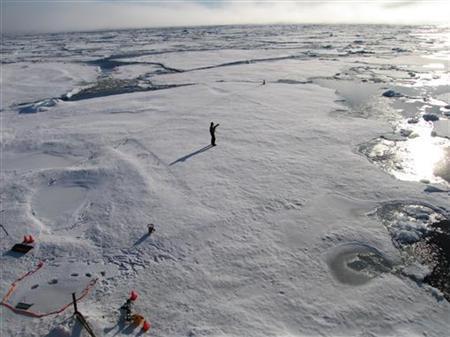
Arctic sea ice this summer melted to a record low extent or will come a close second, two different research institutes said on Tuesday, confirming a trend which could yield an ice-free summer within a decade.
The five biggest melts in a 32-year satellite record have all happened in the past five years, likely a result of both manmade climate change and natural weather patterns.
Arctic sea ice this summer melted to a record low extent or will come a close second, two different research institutes said on Tuesday, confirming a trend which could yield an ice-free  summer within a decade.
summer within a decade.
The five biggest melts in a 32-year satellite record have all happened in the past five years, likely a result of both manmade climate change and natural weather patterns.
One impact of an ice-free summer may be disrupted world weather, with hints already as some scientists blame recent chill winters in Europe and
Researchers at the
The U.S.-based National Snow and Ice Data Center (NSIDC) says this year is number two with the melt season all but over before winter returns to the high Arctic.
"I'm increasingly confident it will remain number two," said Mark Serreze, head of the NSIDC. But the result may be close enough to declare a tie, he added.
Most important than the record was the trend, said
A tie would echo the World Meteorological Organization's view on recent rising global temperatures, after it declared 2010 a tie with 1998 and 2005 for the hottest year since such records began about a century and a half ago.
TREND
Researchers agree that summer sea ice is disappearing faster than expected.
"An 'ice-free' summer
"That means that we see more rapid change than the model scenarios have suggested. It also means that there are processes out there that influence ice that we have yet to understand."
The summer ice retreat has already reached levels which were forecast three decades from now in models used in the U.N. climate panel's flagship report four years ago.
The Intergovernmental Panel on Climate Change (IPCC) used models which forecasted an ice-free summer at the end of this century.
But that could happen as early as 2013, according to one of the most aggressive estimates. Other experts predict an ice-free
"I still see a high likelihood of a near ice-free Arctic Ocean during summer around 2016, plus or minus three years," said Wieslaw Maslowski at the California-based
More difficult to measure than area is ice thickness, which is also diminishing, most scientists agree.
Researchers at the University of Washington in Seattle calculated ice volume, combining area and thickness, reached a record low last year and would do so again this year.

 Previous page
Previous page Back to top
Back to top







